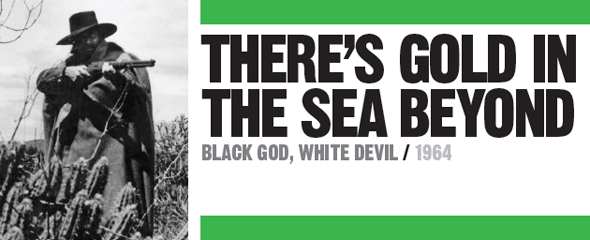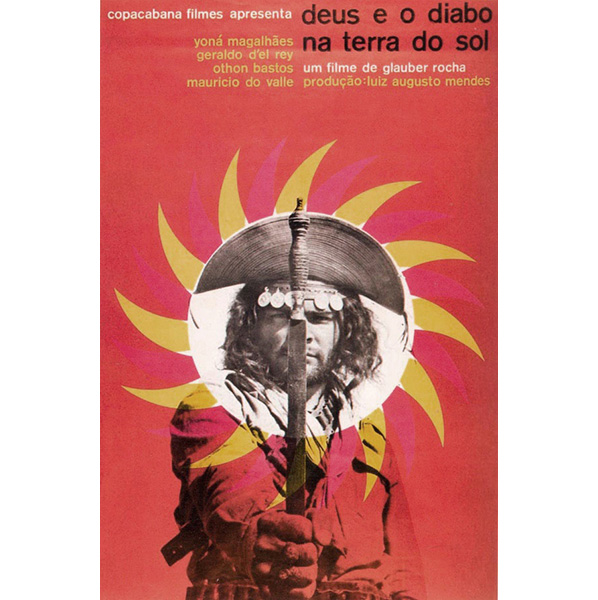The Movie Book (Big Ideas Simply Explained) (2016)


IN CONTEXT
GENRE
Drama
DIRECTOR
Glauber Rocha
WRITER
Glauber Rocha
STARS
Geraldo Del Rey, Yoná Magalhães, Maurício do Valle, Lidio Silva
BEFORE
1962 In Rocha’s debut feature, Barravento, a man struggles to rid his home village of the reactionary mysticism he thinks is holding it back.
AFTER
1966 Italian director Sergio Corbucci’s Django, a bleakly savage spaghetti Western, owes a clear debt to Rocha.
1970 Chilean director Alejandro Jodorowsky’s El Topo features a gunslinger on a transformative journey across the desert.
Director Glauber Rocha once said that “Everybody wants to kill Glauber Rocha. They did not forgive me for making Black God, White Devil at the age of 23.” It was not simply his precociousness or lack of humility that put his life in jeopardy; a fierce pioneer of social realism, Rocha saw movies as a tool of change and an integral part of the working man’s struggle. Indeed, shortly before his movie was released in his native Brazil, a coup ushered in a military government whose actions later drove him into self-imposed exile.

This movie is Glauber Rocha’s fictionalized account of the adventures of real-life bounty hunter Antonio das Mortes.
Committed cinema
Rocha despised Hollywood, and it shows: it’s hard to believe that this abrasive movie was released in the same year as Mary Poppins. Like his debut, Barravento, it is more concerned with ideas than action or character, and it continues the earlier movie’s exploration of religion.
Sebastião (Lidio Silva), a preacher, is rallying the poor of the sertão, the barren outback of north Brazil. A humble ranch hand named Manuel (Geraldo Del Rey) believes the preacher is the incarnation of Saint Sebastian, but his wife, Rosa (Yoná Magalhães), is more sceptical and frequently challenges Manuel’s belief in the man he follows.
Manuel tries to improve his and Rosa’s lot in life by selling his cattle to his boss, but several die on the way to market, and the boss refuses to pay. In a fury, Manuel kills his boss with a machete, and he and Rosa go on the run, following the charismatic and increasingly powerful Sebastião, the “black god,” who promises salvation and the day when “the dry lands will turn into sea and the sea into dry land.” Rosa continues to question the preacher’s banal utterances, but Manuel follows blindly, carrying out ever more mindless and brutal tasks to satisfy his new master. The Church hierarchy, alarmed by Sebastião and the massacres that are engulfing the region, turn to bounty hunter Antonio das Mortes (Maurício do Valle) to eliminate him.

Manuel (Geraldo Del Rey) carries a rock on his head as he climbs Monte Santo on his knees, in thrall to the preacher Sebastiaõ (Lidio Silva). The rock is loaded with symbolism.
Absurdist turn
Sebastião is killed, and the fugitive couple press on, stumbling into a camp run by the vicious Captain Corisco (Othon Bastos), the movie’s “white devil,” who rechristens Manuel “Satan” and folds him into his shambolic army of bandits.
At this point, the style of the movie changes dramatically, and what began as a neorealist drama mutates into an increasingly experimental and surreal polemic, more in the absurdist vein of playwright Samuel Beckett than the politically committed drama of Bertolt Brecht, who was a big influence on Rocha. As the movie draws to a close, the black-clad figure of das Mortes has the almost totally insane Corisco in his sights.
Rallying cry
Sadly, time has not been too kind to Rocha’s movie. The acting often seems mannered or, worse, simply amateur, while the undoubted passion of the director’s vision boils over into moments of thundering melodrama, hammered home by a sometimes overly bombastic score by composer Heitor Villa-Lobos. But in his strange compositions, complete with crash zooms and jump cuts, Rocha created a unique rallying cry for land and liberty, exposing the way that workers are manipulated by church and state alike.
“A man is a man when he uses his gun to change his fate,” says Corisco. “Not a cross [but] a dagger and a rifle.”
GLAUBER ROCHA Director

Born in Bahia, Brazil, in 1939, Glauber Rocha discovered movies, politics, and journalism in his teens, quitting law school to pursue filmmaking at 20. Inspired by the French New Wave, he led Brazil’s Cinema Novo (New Cinema) movement of the 1960s, and competed in the 1964 Cannes film festival with Black God, White Devil. This was the first in a class-conscious trilogy that continued with Entranced Earth and Antonio das Mortes. Exile in the 1970s saw Rocha shooting in Africa and Spain, and though his views and his experimental style were controversial, he remained a hero at home. Within a year of his final movie, The Age of the Earth (1980), he died of a lung infection at 42.
Key movies
1964 Black God, White Devil
1967 Entranced Earth
1969 Antonio das Mortes
What else to watch: Barravento (1962) ✵ Barren Lives (1963) ✵ Soy Cuba (1964) ✵ Entranced Earth (1967) ✵ Antonio das Mortes (1969) ✵ El Topo (1970) ✵ City of God (2002) ✵ Carandiru (2003)